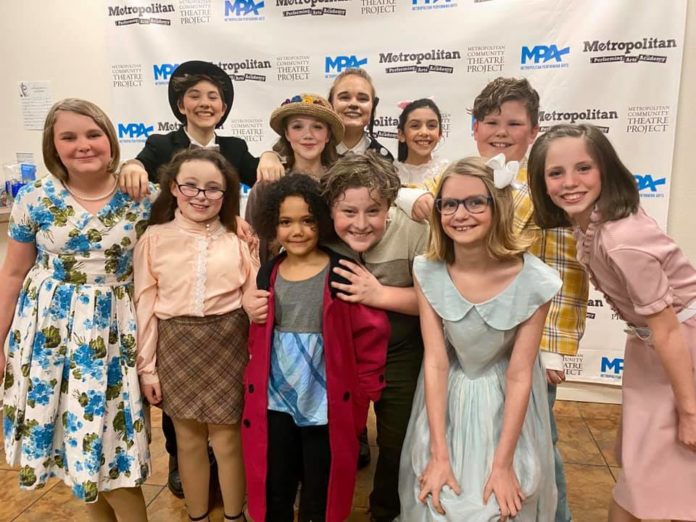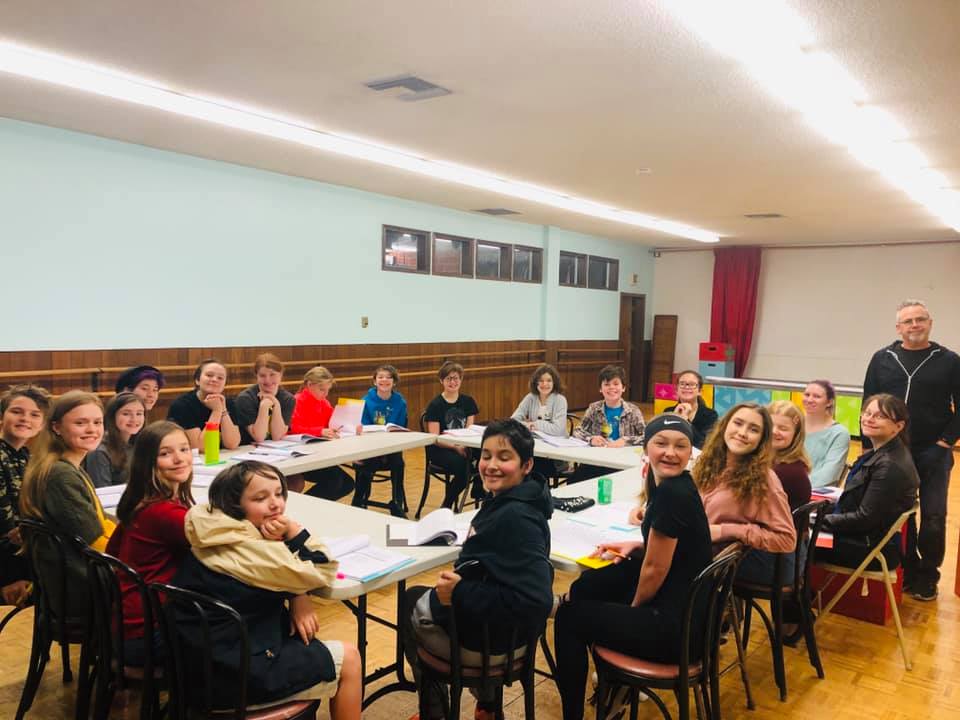
Metropolitan Performing Arts (MPA) was first established as a 501(c)(3) back in the fall of 2009 when individuals in Southwest Washington noticed a lack of education in the performing arts within the Vancouver School District.
“What started as a traveling group that performed at places such as Zoo Lights, Jantzen Beach Mall and community nursing homes has now transformed into a black box theater performance venue, community theater and academy with year-round training and performance opportunities,” said Kristin Heller, artistic and education director at Metropolitan Performing Arts.
Heller said that MPA staged its first musical “Bye Bye Birdie” in April of 2010 at Fort Vancouver High School. Since then, MPA has produced more than 50 productions within the greater Vancouver/Portland area, including The Brunish Theater, Washington State School for the Blind, Vancouver School of Arts and Academics, Triangle! Productions and Camas High School. In 2016, Heller said Barbara Richardson was hired on as the organization’s executive director. In 2019 MPA moved from the Schell Studio to its current location on East Mill Plain Boulevard. The current location has four classrooms and a black box theater. Heller was hired as the artistic and education director in 2022 after Richardson stepped down as executive director.
According to Heller, the mission of MPA is: “To enrich our community by nurturing a lifelong passion and appreciation for live arts through education and performance opportunities. We do this through involving, cultivating, nurturing and enhancing. Our vision: To be a home where everyone is seen, heard, and valued through theater and live arts.”
Heller said MPA’s season 13 theme is “The Power Within, Stories of Self-Acceptance.” They have three community theater productions, three mainstage productions, one teen conservatory production and four Broadway Junior productions centered on this theme. Heller said MPA also offers performance-based classes and technique-based classes. The performance-based classes result in a performance at the end of the term, and these classes are only open for registration at the start of the term and include the Off Broadway and Broadway Junior series. The technique-based classes provide the opportunity for young people to become accomplished musical theater performers and may be enrolled into at any point in the term.
Students are able to train in acting, dance and music to develop the skills that are vital to become a “triple threat,” Heller said. MPA has a technical theater program that allows the students to apprentice directly under one of the organization’s professional designers during the run of a show. They also offer classes in stage combat, improv, makeup design, playwriting, directing and much more, including a brand-new class called Cirque Nouveau, where students work with aerial silks, slacklines, lyra/aerial hoop, acrobatics, clowning and more. MPA also offers a wide range of private lessons in acting, dance, voice, piano and guitar.
Heller said that a small portion of MPA’s budget comes from ticket sales, and a larger portion of the annual budget comes from the academy classes. The rest of their budget comes from donations, grants, bequeathments and sponsorships.
“We could not exist without the generosity of our community,” she said.

Since first starting out as a self-supported performance group that only had classes based on the show they were doing at the time, MPA has grown substantially. They now offer classes that students at any level can take – they don’t even have to be in a show. Heller said they have gone from a company that was only parent volunteers to a company that has 40% community volunteers. MPA also now has its own space with its own theater.
“We were never able to plan a full year in advance as we were always relying on finding our spaces,” Heller said. “This year we were finally able to have a season announcement and we will be able to start selling season tickets. With our own space we are now seeing increased visibility. We have moved from only contracted employees to one full-time staff and two part-time staff (added this year). Originally, there was staff of four. Now we have 16 contracted teachers from the local community, all professionals in the arts and all amazing.”
Right before the COVID-19 pandemic hit, Heller said they were working on a show, “Into the Woods.” When the pandemic hit, she said it was opening night and the show was never performed. This was not only a financial hit to MPA as their ticket sales normally pay for the licensing and creative staffing of the show, but Heller said it was “also a hit to our hearts.”
“Imagine a project that you have worked so hard for three months on, that you are really proud of, and it is never to be seen,” she said. “No parents were able to take pride in their kids’ performances, no friends were able to cheer from the audience and no community was given inspiration, enjoyment, wonder or storytelling. Some of the students were graduating high school and this was their last show with MPA, some of the community members were moving away and would not in the area to perform with us in the near future.”
On top of all of that, Heller said all classes went online and they adapted as all theater artists are taught to do. She said they immediately noticed a drop in enrollment. Kids that had bad Wi-Fi or no home internet could no longer participate. She said all of their students were met with additional struggles and the anxiety that change brings, especially students with neurodivergence, ADHD and autism. Some had to take a break from classes entirely due to the stress and anxiety this change caused.
Also during the pandemic, Heller said teachers had to be let go or learn completely new skills like audio engineering and video editing. She said these teachers did most of this additional work on a volunteer basis as there was no additional money to pay for this extra work.
“Classes kept shrinking but we had students that needed to be in class,” Heller said. “They needed to keep learning and doing theater. We kept going for them to have a safe space to keep creating and being inspired in a world that felt like it was mad.”
When explaining why MPA is important to the community, Heller said she could really sum it up with just one word – hope.
“I could just stop there,” she said. “Theatre and arts education gives us hope for the future. We are teaching skills like self-confidence, public speaking and leadership. We are also teaching awareness, compassion, creativity, passion and drive. The kids that work on shows work as a team for three months to create and perform a final project for the world to see. They have to work together. They learn together and they struggle together. Theatre is an outlet. It is a way to tell stories of struggle, happiness, inspiration and disaster. We learn about the world from the arts. Diversity from the arts. Acceptance and Individuality from the arts. When I see the work that the students, volunteers and community members do here at MPA, I feel hope.”
To learn more about Metropolitan Performing Arts and how you can help support the organization, visit their website at metropolitanperformingarts.org.




